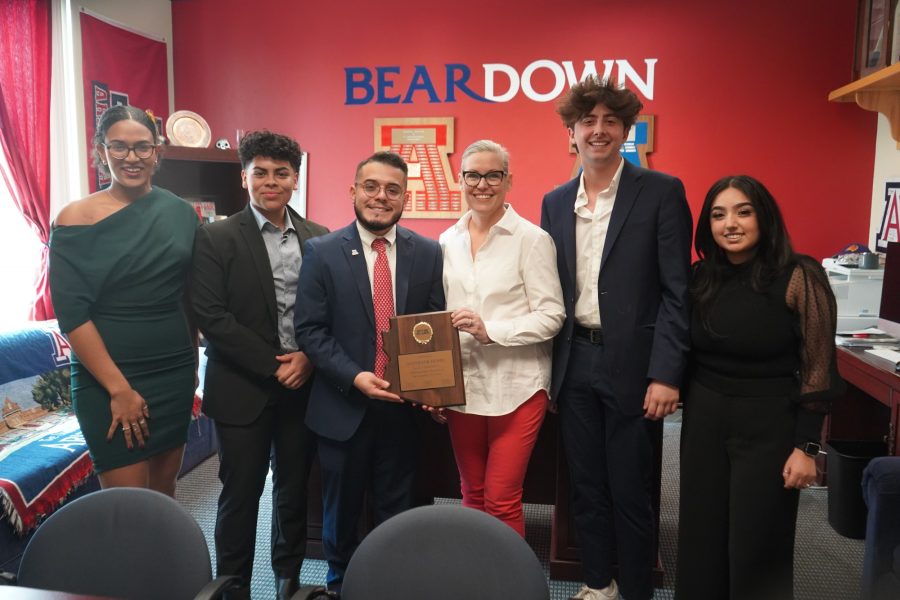Gov. Katie Hobbs spoke with representatives from the Associated Students of the University of Arizona about food insecurity on campus and the need to extend SNAP benefits for students.
ASUA hosted the governor in its office space, located on the third floor of the Student Union Memorial Center, on Saturday. The meeting, which lasted approximately 30 minutes, consisted of Hobbs and four staff members asking ASUA officials questions about Campus Pantry, meal plans and ASUA’s request to extend SNAP exemptions for students.
Student Body President Patrick Robles began the meeting by introducing Yessenia Torres, the development chair for Campus Pantry, who spoke on the importance of the pantry.
“We realized that people were relying on us to have their only source of food for the week,” Torres said.
An Arizona Board of Regents report on student food and housing insecurity found that 35% of UA students surveyed in Spring 2021 experienced food insecurity. 17% of respondents said that they did not eat for an entire day because there wasn’t enough money for food at least once within the previous 12 months.
One solution to student food insecurity is the Supplemental Nutrition Assistance Program. SNAP enrollment is associated with higher retention rates among college students and can increase students’ financial stability according to Temple University’s Hope Center for College, Community, and Justice.
The Consolidated Appropriations Act of 2021 temporarily expanded eligibility for students who qualified for state or federal work study (without requiring them to participate in work-study) and students with an Expected Family Contribution of zero. These temporary exemptions will end 30 days after May 11, which is when the federal government will lift nationwide COVID-19 emergency declarations.
The conversation turned to mandatory meal plans after an inquiry from Hobbs’ chief of staff, Allie Bones. ASUA Executive Vice President Nico Nieri-Lang explained the university’s plan to mandate meal plans for freshmen living on campus starting next academic year.
Representatives from ASUA currently sit on a committee that will provide guidance on waivers for the mandatory meal plan, including exemptions for students from low-income families, students with religious dietary restrictions, students in Greek Life and others. Details on the waivers haven’t been finalized.
Turning the discussion back to SNAP benefits, ASUA Administrative Vice President Lauryn White expressed concern that students will have to sacrifice academics to work more hours and maintain their SNAP eligibility.
“After May 11, if students want to be eligible for SNAP benefits, they must work more than 20 hours a week,” White said, “but it’s been shown by studies all across the nation that students that work more than 12-15 hours a week while enrolled in full-time school see those grades suffer.”
Nieri-Lang added, “Those eligibility requirements are supposed to be something that helps students, but it ends up turning into a barrier.”
At the end of the meeting, Hobbs asked ASUA what it wanted from the governor’s office.
“We would love to see how we can partner up with your office to advocate, whether that’s talking to folks in the state house or state senate so that folks get the holistic view of the importance of allowing college students to receive SNAP benefits,” Robles said.
Hobbs replied that her team would let the congressional delegation know the issue is a priority and they would be in touch with ASUA again soon.
ASUA’s goal is to start a conversation around legislation that would extend SNAP benefits for students, similar to other states that have already done the same. Eddie Barron, Robles’s chief of staff, specifically named Virginia and California as two states that have passed bills related to SNAP benefits for students.
Virginia passed HB 582 in April 2022 which requires public colleges in the state to ensure all students had access to information about SNAP and also mandates that they advertise the information multiple times a year. California passed AB 2810 in September 2022 which requires California State University and California Community College students to notify students who are eligible for SNAP benefits using data from FAFSA to identify them.
After the meeting, Robles expressed satisfaction with the result of the discussion.
“Although it was a short period of time, I believe we got our message across, and right before they left, the governor’s Southern Arizona director came to me and said ‘we’ll be in touch.’ ”
Follow Kristijan Barnjak on Twitter









